Studying Law at Goldsmiths is a distinctive learning experience. It equips you with unique career skills. Just check out our students’ itinerary from the last two weeks and see for yourselves why.
Monday 7 March
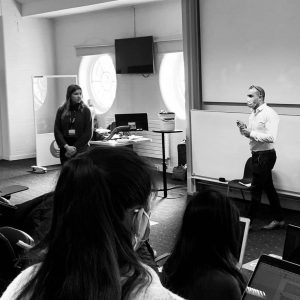 10 a.m.: French academic Jérémy Bourgais, from the University of Poitiers, visits the ‘English Legal System in a Global Context’ class to speak about criminal trials in France and Europe. Students are asked to imagine where they would sit, and what roles they would play, in a French courtroom, and identify differences with English courts. Our programme has a strong international focus!
10 a.m.: French academic Jérémy Bourgais, from the University of Poitiers, visits the ‘English Legal System in a Global Context’ class to speak about criminal trials in France and Europe. Students are asked to imagine where they would sit, and what roles they would play, in a French courtroom, and identify differences with English courts. Our programme has a strong international focus!

Head of Mishcon Academy, Patrick Connolly, speaking about training contracts to Goldsmiths Law students
4.30 p.m.: Leading law firm Mishcon de Reya visit us on campus. Students are given guidance about when and how to apply for a training contract. In your applications, show how “you are unique” is the key message; talk about all the work you have done in your programme to show how you stand out from other candidates.
Tuesday 8 March, 10 a.m.
Year 1 students visit the highest court in the land, the UK Supreme Court (as part of their Public Law lectures). They take part in a workshop about the history and role of the court, attend a live hearing, visit the Court’s exhibition and discuss their experience over coffee and cake with their lecturers at the end.

Friday March 11, 9 a.m.
It’s Year 1 students again. This time they’re taking part in a Crown Court mock trial, in the Council Chamber at the Deptford Town Hall, in front of barrister, and actor, Ms Shereener Browne, who plays the role of a witness.

Monday March 14, 5 p.m.
Students participate in our Law careers fair, with speakers from leading firms like Macfarlanes and Kingsley Napley to NGOs and charities such as Justice and Lawyers Against Poverty. Students meet senior prosecutors and experts from the Crown Prosecution Service too, and begin to think about careers there; the CPS is the biggest legal employer in the UK.


Wednesday March 16, 10 a.m.
 We’re in the heart of legal London, visiting ‘Magic Circle’ law firm Linklaters. Our students meet Competition Law experts and learn about the competitive process of applying there. The term ‘Magic Circle’ describes the five most prestigious, London-headquartered, law firms, which offer lucrative careers to those aspiring to work in areas such as corporate law, commercial law or banking law and intellectual property.
We’re in the heart of legal London, visiting ‘Magic Circle’ law firm Linklaters. Our students meet Competition Law experts and learn about the competitive process of applying there. The term ‘Magic Circle’ describes the five most prestigious, London-headquartered, law firms, which offer lucrative careers to those aspiring to work in areas such as corporate law, commercial law or banking law and intellectual property.
Thursday, March 17
11 a.m.: Year 3 students in the ‘Criminal Evidence’ module do a jury deliberations exercise (The Evidence Chamber) with a former theatre company. The jury of 12 are each given an iPad and have electronic evidence presented to them — e.g. a DNA match, and recordings from the police interrogation of the suspect — before they’re asked to consider their verdict.
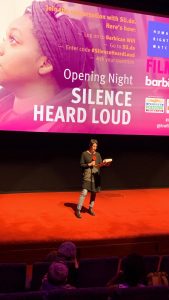 6 p.m.: the department organises a night out in London, for the opening night of the Human Rights Watch London film festival, at the Barbican Centre, where we watch Silence Heard Loud and take part in the post-screening Q & A.
6 p.m.: the department organises a night out in London, for the opening night of the Human Rights Watch London film festival, at the Barbican Centre, where we watch Silence Heard Loud and take part in the post-screening Q & A.
An exciting range of activities follow on until the end of term, from a ‘Grenfell tort claims’ exercise to a debating exercise (in International Trade Law ) and theatre trip (in Criminal Law), a mock trial at the Old Bailey (in Criminal Evidence) as well as visits to Mishcon de Reya’s offices and the Van Gogh immersive exhibition in the ‘Art Law’ module.
Studying Law at Goldsmiths is so much more than going to lectures and seminars on campus. We have a Law programme that is uniquely vibrant, professionally empowering and intellectually stimulating.
If you want to find out more about studying Law at Goldsmiths, get in touch via law@gold.ac.uk
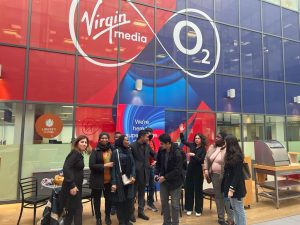
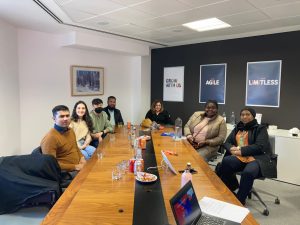 We are very thankful to Andrea Murray for speaking to our students for the role of the in house lawyer in a major multinational firm like Liberty Global, and the career opportunities that exist there. Andrea is a senior lawyer at Virgin Media 02, one of the largest mobile and broadband companies in the UK which is co-owned by Liberty Global. Andrea was joined by Hannah Beresford, a legal adviser at Liberty Global, who also advised on the SQE.
We are very thankful to Andrea Murray for speaking to our students for the role of the in house lawyer in a major multinational firm like Liberty Global, and the career opportunities that exist there. Andrea is a senior lawyer at Virgin Media 02, one of the largest mobile and broadband companies in the UK which is co-owned by Liberty Global. Andrea was joined by Hannah Beresford, a legal adviser at Liberty Global, who also advised on the SQE. 10 a.m.: French academic Jérémy Bourgais, from the University of Poitiers, visits the ‘English Legal System in a Global Context’ class to speak about criminal trials in France and Europe. Students are asked to imagine where they would sit, and what roles they would play, in a French courtroom, and identify differences with English courts. Our programme has a strong international focus!
10 a.m.: French academic Jérémy Bourgais, from the University of Poitiers, visits the ‘English Legal System in a Global Context’ class to speak about criminal trials in France and Europe. Students are asked to imagine where they would sit, and what roles they would play, in a French courtroom, and identify differences with English courts. Our programme has a strong international focus!




 We’re in the heart of legal London, visiting ‘Magic Circle’ law firm
We’re in the heart of legal London, visiting ‘Magic Circle’ law firm  6 p.m.: the department organises a night out in London, for the opening night of the Human Rights Watch London film festival, at the Barbican Centre, where we watch
6 p.m.: the department organises a night out in London, for the opening night of the Human Rights Watch London film festival, at the Barbican Centre, where we watch 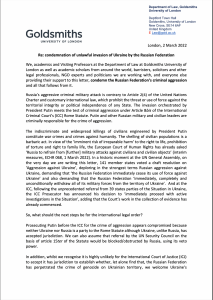 Joining forces with 90 leading legal academics and other academic scholars, barristers, solicitors and other legal professionals, NGO experts and politicians, from across the UK and other parts of Europe, Goldsmiths Law academics have drafted, signed and widely circulated an open letter that:
Joining forces with 90 leading legal academics and other academic scholars, barristers, solicitors and other legal professionals, NGO experts and politicians, from across the UK and other parts of Europe, Goldsmiths Law academics have drafted, signed and widely circulated an open letter that: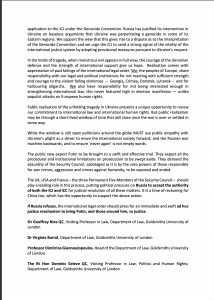 (c) (failing that) calls for an ad hoc justice mechanism to bring Putin, and those around him, to justice.
(c) (failing that) calls for an ad hoc justice mechanism to bring Putin, and those around him, to justice.